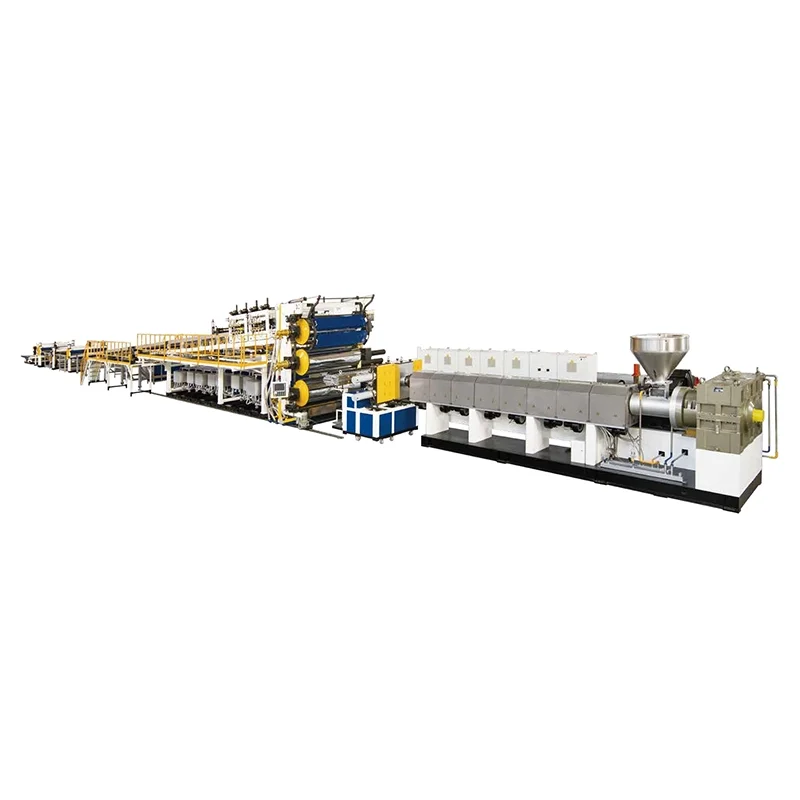The term thick plate extrusion line refers to a highly specialized production system designed to manufacture thick thermoplastic plates with precision and consistency. These plates, often ranging in thickness up to 50mm, serve as essential materials across multiple industries, including chemical processing, construction, automotive, energy, and household appliances.
Unlike traditional sheet extrusion, a thick plate extrusion line integrates advanced heating, temperature control, and post-forming systems, ensuring that the final product meets strict quality and durability requirements. With increasing demand for high-performance materials, these extrusion lines have become indispensable in modern manufacturing. In this blog post, Suzhou Jwell, a high performance jwell extrusion machinery exporter, will share the role of thick plate extrusion line in manufacturing, its features, applications, etc.
PP Thick Plate Extrusion Line in Industrial Applications
One of the most common categories is the PP thick plate extrusion line, which produces polypropylene plates. PP is an environmentally friendly polymer known for its low density, excellent corrosion resistance, and broad application range.
Polypropylene plates manufactured through a thick plate extrusion system are widely used in:
-
Chemical industry: corrosion-resistant tanks and containers.
-
Food industry: hygienic storage and transport solutions.
-
Environmental equipment: filtration, ventilation, and recycling systems.
-
Anti-erosion structures: protective barriers and linings.
A PP thick plate extrusion line with a working width of 2000mm represents the latest advancement in the market, combining efficiency with stability to outperform traditional systems.
Versatility of PE Thick Plate Extrusion Line
Another important variant is the PE thick plate extrusion line, which produces polyethylene plates. High-density polyethylene (HDPE), in particular, is recognized as an engineering plastic due to its mechanical strength and resistance to chemicals.
PE plates serve multiple purposes:
-
Power and chemical industries: storage tanks, insulating panels, and sealing parts.
-
Mechanical equipment: structural supports and wear-resistant components.
-
Sports facilities: HDPE is famously used in ice hockey rink walls because of its impact resistance.
A well-designed PE thick plate extrusion line ensures that the extrusion process maintains the material’s molecular integrity, which is critical for high-stress applications.

ABS Thick Plate Extrusion Line: Supporting Modern Electronics
The ABS thick plate extrusion line caters to one of the most versatile thermoplastics in modern manufacturing. Acrylonitrile butadiene styrene (ABS) offers a unique balance of toughness, heat resistance, and impact strength, making it a material of choice for consumer-focused industries.
Key applications of ABS plates include:
-
Home appliances: structural panels, internal supports, and casings.
-
Electronics: housings for electronic devices, dashboards, and panels.
-
Packaging: rigid protective materials.
-
Medical industry: components requiring precision and hygiene.
An ABS thick plate extrusion system emphasizes precision in temperature control and cooling, ensuring the smooth surface finish and dimensional accuracy necessary for high-end applications.
PVC Thick Plate Extrusion Line and Environmental Engineering
The PVC thick plate extrusion line plays a critical role in industries where chemical resistance and structural stability are paramount. Rigid PVC plates are highly resistant to corrosion, making them ideal for aggressive working environments.
Applications include:
-
Chemical and petroleum industries: pipelines, protective covers, and lining materials.
-
Electroplating: resistant surfaces for plating tanks.
-
Water purification: durable panels in filtration and recycling systems.
-
Advertisements and lighting: boards, signboards, and lamp housings.
In addition, PVC thick plates are a sustainable choice, as many production systems are optimized for recycling and reduced emissions, aligning with modern environmental standards.
Key Features of Thick Plate Extrusion Line
What distinguishes a modern thick plate extrusion line from older models is its integration of automation, precision, and flexibility. Some of the most significant features include:
-
Material versatility: Capable of processing PP, PE, ABS, and PVC with dedicated extrusion models.
-
Temperature control: Advanced hardcover temperature regulation ensures uniformity across plate thickness.
-
Automation: Waste edge cutting, online processing, automatic stacking, packaging, and transport are streamlined into one continuous system.
-
Thickness range: Production lines can manufacture plates up to 50mm thick, covering a wide scope of industry demands.
-
Stability and efficiency: Newly developed lines, especially 2000mm-wide models, offer superior stability compared to competitors.
Why Thick Plate Extrusion Systems Drive Industry Growth?
The global demand for durable, corrosion-resistant, and environmentally safe plastic plates continues to rise. Industries increasingly seek localized production of thick plates to reduce logistics costs, meet sustainability goals, and ensure quality control.
A thick plate extrusion line allows manufacturers to:
-
Adapt to market needs with customized plate dimensions and properties.
-
Reduce costs through automation and high-output efficiency.
-
Meet sustainability goals by reprocessing waste edges and integrating eco-friendly resins.
-
Expand applications into new fields, such as renewable energy and medical technologies.
Conclusion
The thick plate extrusion line is no longer just a production tool; it is a cornerstone of material innovation. From PP and PE to ABS and PVC, each extrusion line brings unique advantages tailored to specific industries. With automation, advanced temperature control, and wide-ranging applications, these systems provide the efficiency and reliability demanded by modern manufacturing.
As industries continue to prioritize sustainable and high-performance materials, the development of thick plate extrusion technology will play an even more vital role in shaping future solutions.
www.jwellplas.com
Suzhou Jwell